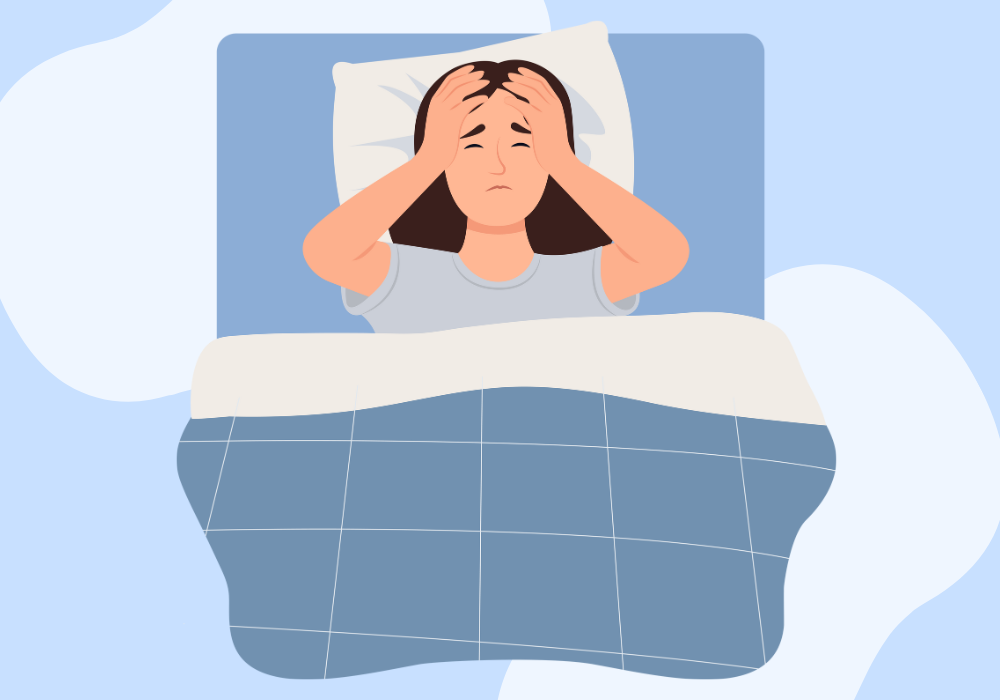Have you ever felt really tired, but your brain just won’t turn off? You’re not alone. Even when your body wants to sleep, certain things, like stress, screen time, or your daily habits, can get in the way. Sleep helps your body rest and your brain feel better. But if just one thing is off, it can throw your sleep out of balance. The good news? A few small changes can lead to better sleep over time.
The Sleep-Mental Health Connection
When you don’t sleep well, it’s harder to handle stress, anxiety, or depression. And those same feelings can also keep you awake. It’s a tough cycle. But don’t worry, there are ways to break it. Start by building small, healthy habits every day. They can help you sleep better and feel better.
What Is Sleep Hygiene?
Sleep hygiene means having good habits that help your brain know when it’s time to sleep.
Bad habits, like staying up late, using your phone in bed, or drinking caffeine, can confuse your body and make it harder to fall asleep.
Easy Tips for Better Sleep (Backed by Science)
- Stick to a routine: Go to bed and wake up at the same time, even on weekends.
- Keep your bed for sleeping: No phones or homework in bed.
- Cut back on caffeine and alcohol: Especially after 2 p.m.
- Relax before bed: Take a bath, stretch, or read a book.
- Avoid naps after 2 p.m.: They can make it harder to fall asleep.
- Move your body: Exercise during the day, but not right before bed.
- Make your room sleep-friendly: Keep it dark, cool, and quiet.
- Try tools like earplugs or sleep masks: These can block out noise or light.
Still Can’t Sleep? Try These Tools
- Try “reverse psychology”: Tell yourself to stay awake. It takes the pressure off and helps you relax.
- Write it out: Before bed, jot down your worries or tomorrow’s to-do list. This clears your mind.
Why This Matters
Life is stressful, especially with phones, school, and work all blending together.
Poor sleep can affect your mood, memory, and health. If you already deal with stress, anxiety, or other mental health issues, getting good sleep is even more important.
Small Habits, Big Impact
You have enough to worry about, school, work, life. Don’t let poor sleep add to the list.
Making a few small changes to your bedtime routine can help your body rest and your brain recharge. You don’t have to give up your phone completely, just use it in a smarter way before bed.
Engagement Questions:
- What bedtime habit helps you relax the most?
- Have you ever tried writing down your thoughts before bed?
- What makes it hardest for you to fall asleep at night?
ADAA Resources
References:
- Benca, R. M., Obermeyer, W. H., Thisted, R. A., & Gillin, J. C. (1992). Sleep and psychiatric disorders: A meta-analysis of polysomnographic research. Psychological Bulletin, 111(2), 222–249. https://doi.org/10.1037/0033-2909.111.2.222
- Cain, N., & Gradisar, M. (2010). Electronic media use and sleep in school-aged children and adolescents: A review. Sleep Medicine, 11(8), 735–742. https://doi.org/10.1016/j.sleep.2010.02.006
- Dautovich, N. D., McCrae, C. S., & Rowe, M. (2008). Subjective and objective napping and sleep in older adults: Are evening naps “bad” for nighttime sleep? Journal of the American Geriatrics Society, 56(9), 1681–1686. https://doi.org/10.1111/j.1532-5415.2008.01846.x
- Ebrahim, I. O., Shapiro, C. M., Williams, A. J., & Fenwick, P. B. (2013). Alcohol and sleep I: Effects on normal sleep. Alcoholism: Clinical and Experimental Research, 37(4), 539–549. https://doi.org/10.1111/acer.12006
- Exelmans, L., & Van den Bulck, J. (2016). Bedtime mobile phone use and sleep in adults. Social Science & Medicine, 148, 93–101. https://doi.org/10.1016/j.socscimed.2015.11.037
- Hirshkowitz, M., Whiton, K., Albert, S. M., Alessi, C., Bruni, O., DonCarlos, L., … & Adams Hillard, P. J. (2015). National Sleep Foundation’s sleep time duration recommendations: Methodology and results summary. Sleep Health, 1(1), 40–43. https://doi.org/10.1016/j.sleh.2014.12.010
- Kredlow, M. A., Capozzoli, M. C., Hearon, B. A., Calkins, A. W., & Otto, M. W. (2015). The effects of physical activity on sleep: A meta-analytic review. Journal of Behavioral Medicine, 38(3), 427–449. https://doi.org/10.1007/s10865-015-9617-6
- Okajima, I., Nakajima, S., Kobayashi, M., & Inoue, Y. (2011). A meta-analysis on the treatment effectiveness of cognitive behavioral therapy for primary insomnia. Sleep and Biological Rhythms, 9(1), 24–34. https://doi.org/10.1111/j.1479-8425.2010.00459.x
- Roehrs, T., & Roth, T. (2008). Caffeine: Sleep and daytime sleepiness. Sleep Medicine Reviews, 12(2), 153–162. https://doi.org/10.1016/j.smrv.2007.07.004
- Scott, A. J., Webb, T. L., Martyn-St James, M., Rowse, G., & Weich, S. (2021). Improving sleep quality leads to better mental health: A meta-analysis of randomised controlled trials. Sleep, 44(2), zsaa084. https://doi.org/10.1093/sleep/zsaa084
- Wallace, M. L., Buysse, D. J., Redline, S., Stone, K. L., Ensrud, K. E., Leng, Y., … & Spira, A. P. (2018). Multidimensional sleep and mortality in older adults: A machine-learning comparison with other risk factors. The Journals of Gerontology: Series A, 74(12), 1903–1909. https://doi.org/10.1093/gerona/gly272
- Espie, C. A. (2012). Insomnia: Conceptual issues in the development, persistence, and treatment of sleep disorder in adults. Annual Review of Psychology, 63, 215–243. https://doi.org/10.1146/annurev-psych-120710-100457
- Harvey, A. G., Tang, N. K. Y., & Browning, L. (2014). Paradoxical intention in the treatment of insomnia. Behavior Research and Therapy, 52, 1–8. https://doi.org/10.1016/j.brat.2013.10.009
- Scullin, M. K., & Bliwise, D. L. (2015). Sleep, cognition, and normal aging: Integrating a half century of multidisciplinary research. Perspectives on Psychological Science, 10(1), 97–137. https://doi.org/10.1177/1745691614556680
- Rusch, H. L., Rosario, M., Levison, L. M., Olivera, A., Livingston, W. S., Wu, T., & Gill, J.
M. (2019). The effect of worry and rumination on sleep quality: A systematic review and meta-analysis. Sleep Medicine Reviews, 43, 1–12. https://doi.org/10.1016/j.smrv.2018.10.004 - Sweetman, A., Lack, L., Catcheside, P., Antic, N. A., Chai-Coetzer, C. L., Smith, S. S., & Marshall, N. S. (2021). Cognitive behavioral therapy for insomnia reduces sleep apnoea severity: A randomised controlled trial. Journal of Clinical Sleep Medicine, 17(2), 255–263. https://doi.org/10.5664/jcsm.8986
- R Pigeon, W. R., Bishop, T. M., & Titus, C. E. (2021). The future of behavioral sleep medicine: A report from the Society of Behavioral Sleep Medicine Research Task Force. Behavioral Sleep Medicine, 19(5), 632–645. https://doi.org/10.1080/15402002.2021.1967182







